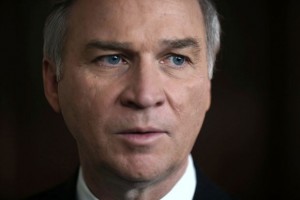Along with income inequality, one of the most-discussed issues in the Presidential election year is the role of money in political campaigns. Following the Roberts Court’s ruling in the Citizens United Case, which basically equated money with free speech, large numbers of Political Action Committees masquerading as charities, such as the Americans for Progress, were supported by wealthy donors to funnel money to selected candidates. These so-called super-PACs could raise unlimited amounts as long as they were not “coordinated” with the candidate’s campaign. This process and it after-math are the heart of Jane Mayer’s new book, “Dark Money.”
According to the book, Ed Gillespie, currently the front-runner for the Republican nomination for Governor of Virginia, was one of the first political operatives to realize the potential surrounding the Supreme Court’s decision, and began to organize attacks on regulation having to do with environmental protection and tax policy.
The perception that business is under attack and a response must be begun dates back to the early 1970’s. Lewis Powell, a Richmond lawyer who served as a distinguished member of the Supreme Court, outlined a type of response that included an organized to roll back regulations and other government policies that, he perceived, were undermining the American private Enterprise System. (see reclaim democracy.org). Powell served on many corporate boards including tobacco giant Phillip Morris. His ideas were taken up by several individuals of significant wealth.
The book indicates that those who found the dark side of American politics are mindful in operations that have significant impact on the environment.
The Olin Corporation is an example. Olin was a significant polluter. It was the largest manufacturer of DDT, which was eventual banned by the government in 1972. In the town of Saltville, Va., Olin’s Chlorine production spilled significant amount of mercury into the Holston River. The company ceased operations shortly after it was reported from Japan that large exposure to mercury in water caused birth defects. Members of the Olin family are significant contributors to conservative think tanks such as the Heritage Foundation and the American Enterprise Institute
The most significant of the “dirty money” fraternity are the Koch brothers (No relation to former mayor of NY Ed Koch). Their oil refining and pipeline business if one of the largest privately-held pipeline companies in the United States. The family has a very interesting history. Earlier generations did business with both Nazi Germany and Stalinist Russia. Family members were members of the John Birch Society. This is the same group that believed that President Eisenhower was a Communist.
In her research, Jane Mayer discusses many legal problems that Koch industries has had under the current leadership of Davis and Charles Koch, some involving outright theft of oil from Native Americans’ reservations, significant instances of pollution. One particularly disturbing case involved the death of an employee named Donald Carson who died of Leukemia in 1997. Doctors believe that his cancer was the result of exposure to benzene, a chemical involved in refining crude oil. The Kochs refused to pay him Workmen’s Compensation even though a company-sponsored blood test indicated five years before his death that his blood was poisoned. The employee was subsequently terminated from the company. Charles Koch believes that government regulations are “socialistic.” Employees within the company that brought up potential health issues to OSHA were fired. In one case, involving a pipeline explosion, resulting in the death of an employee, a jury found that the Koch’s not only negligent but malicious, ordering them to pay a settlement three times the hundred million Dollars that was originally requested.
Ms. Mayer does acknowledge that the Koch Brothers have given significantly to “real charities” such as Lincoln Center in New York and several medical research institutes. According to the author, these contributions served to soften their image and make their political activities seem less threatening and less self-serving.
Following the plan, laid out many years ago by Lewis Powell, American Universities are the fountainhead of anti-business attitudes in the United States. The theories of the Austrian school of economics was believed to provide an intellectual basis for the type of free-for-all capitalism advocated by the Koch brothers. In 1981, the Mercatus Center was established at the George Mason University in George Mason University. The Center claimed that it “bridged the gap between academic ideas and real world problems.” Records obtained by Jane Myer indicate that the brothers have contributed $30 million to the Institute. One historian on the faculty describes the institute as a “lobbying group for corporate interests.”
Whether you agree with the author, Jane Mayer, the current rise of “outsider politicians” in both parties shows that much of the public perceives that the system is rigged in favor of the ultra wealthy.
— D. Leslie Schreiber






